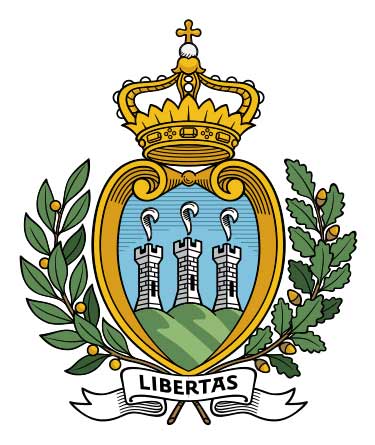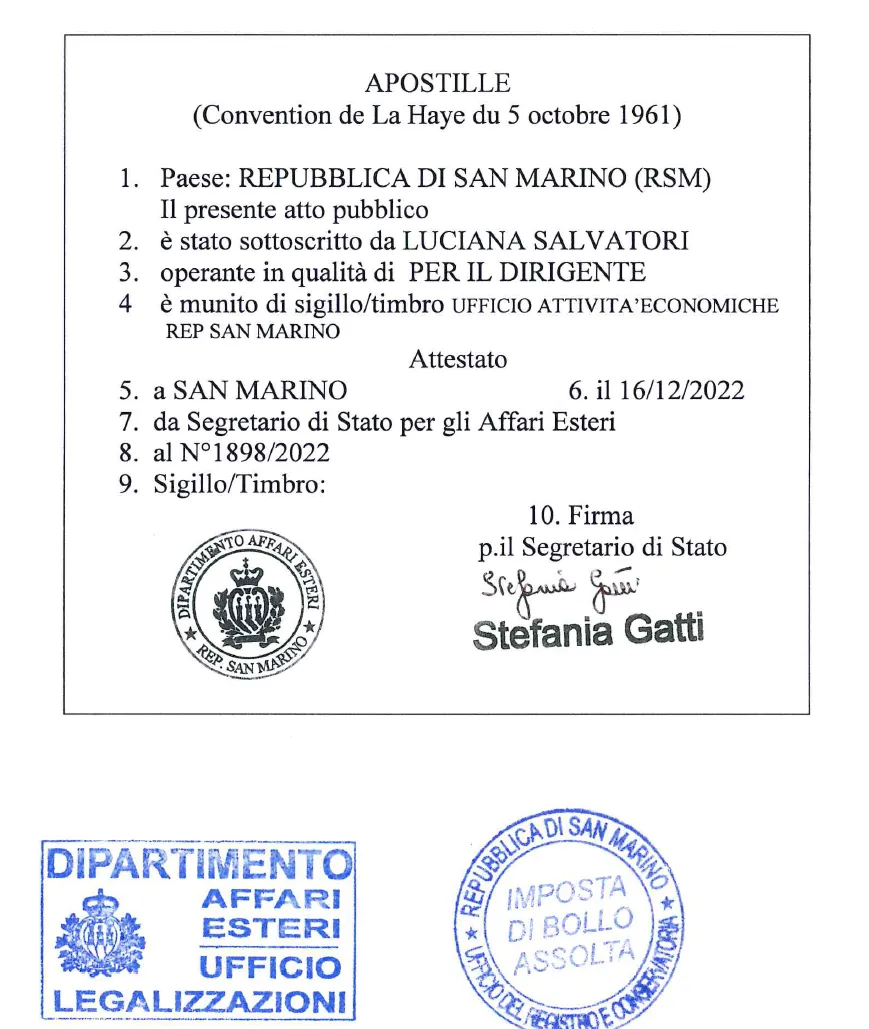
Schmidt & Schmidt covers the full spectrum of legalization services for documents issued in San Marino.
San Marino joined the Hague Convention on the Simplified Authentication of Documents on 26 May 1994; the Convention entered into force on 13 February 1995.
The apostille, or the “Hague apostille” is a certificate that authenticates the origin of a public document (e.g., a birth, marriage or death certificate, a judgment, an extract of a register or a notarial attestation). It confirms the authenticity of the signature and the authority of an official who signed the public document.
Documents issued in San Marino are certified with an apostille in accordance with the Hague Convention of 1961 are recognized in all Member States of the Hague Convention and do not require any other form of certification, such as consular legalization, which considerably reduces the costs and time required for the certification of documents. So far, more than 120 states have joined the Convention.
The apostille is not sufficient for use in the states that are not party to the Hague Convention. In this case, consular legalization applies to a public document.
Designated Competent Apostille Authorities in San Marino
Within the territory of San Marino, the task of issuing apostilles rests with the designated Competent Authority, namely The Ministry of Foreign Affairs. It holds the responsibility to authenticate and endorse the necessary documents for international recognition through the apostille process.
This procedural step, often referred to as apostillization, is a fundamental requirement for documents originating from San Marino that are intended to be presented overseas. Whether it's educational records, legal documents, or any other official papers, obtaining an apostille from the Ministry of Foreign Affairs adds a layer of international recognition and acceptance. It's important to note that this process comes with a nominal fee of 5.00€.
The apostille in San Marino is a square stamp in Italian with the obligatory heading "Apostille" and a reference to the 1961 Hague Convention in French (Convention de La Haye du 5 octobre 1961). The apostille certificate’s sides will be at least 9 centimeters long.
Types of documents

| Can be apostillized | Cannot be apostillized |
|---|---|
|
|
Specific aspects and document requirements for the apostille in San Marino
The apostille process can vary depending on the sender and recipient country, but typically to obtain an apostille for a document in San Marino, you must go through the following steps:
- Obtaining the original document to be apostilled;
- Verification of the signature on the document by the authorized body;
- Issuance of an apostille on a document by an authorized body;
- Submission of the document together with the apostille in the recipient country.
This process can be time-consuming, especially if it includes multiple documents and different countries. To ensure a smooth and accurate apostille process, it is recommended to seek guidance from specialists familiar with the requirements and procedures. Their expertise can help avoid delays and errors in obtaining documents apostille.
Document requirements that might apply:
- The document must be an original or a certified copy issued by the competent authority.
- The document should contain all relevant and accurate information.
- The document must be in the official language of the issuing country or translated into the official language of the country where the apostille is sought.
- The apostille must be affixed by the designated competent authority in accordance with regulations.
The apostille is issued in a uniform format. In San Marino, it has the form of a printed sticker with a handwritten signature of an official, an official seal, and a hologram.
In cases where apostilles are not recognized, holders of foreign documents will need to legalize them instead. However, If the country of destination of the document recognizes and issues apostilles, then legalization is unnecessary.
Legalization of San Marino educational documents for use abroad
The process of legalizing educational documents in San Marino involves submitting them to the designated authority along with the required fee. Once your document is legalized, it serves as an internationally recognized endorsement of their authenticity. This is particularly important when presenting your educational credentials to foreign institutions, employers, or authorities.
When it comes to legalizing educational documents from San Marino for international use, there are specific procedures in place. The process of legalizing these documents involves several steps, which can be categorized into two distinct procedure, depending on the service that fits your best: a more lengthy, comprehensive procedure and a simplified process.
By undergoing the apostille process, your San Marino educational documents gain credibility and acceptance across borders. This ensures that your academic achievements are acknowledged and respected in foreign countries, contributing to your opportunities for further education, employment, and professional growth on an international scale.
Recognition of the authenticity of public documents within the EU
Documents from countries with which San Marino has bilateral agreements for exemption from legalization are not required to undergo any form of legalization procedures. Some of these include:
- Convention of friendship and good neighbourliness between Italy and San Marino, signed in Rome on 31 March, 1939, as amended by the Additional Agreement to the Convention, on administrative assistance, dual citizenship and military service, with an exchange of letters between Italy and San Marino, signed in San Marino on 28 October, 1980;
- Agreement between Italy and Belgium relating to the reciprocal free release of documents concerning civil status and the abolition of their legalization signed, by exchange of Notes, in Rome on 24 October, 1950;
- Convention on the issue of certain extracts from civil status records to be used abroad, signed in Paris on 27 September 1956 // Convention relative à la délivrance de certains extraits d'actes de l'état civil destinés à l'étranger, faite à Paris le 27 septembre 1956;
- Convention for the free issue and exemption from legalization of civil status documents and annex, signed in Luxembourg on 26 September, 1957 // Convention relative à la délivrance gratuite et à la dispense de légalisation des expéditions d'actes de l'état civil, Faite à Luxembourg le 26 septembre 1957;
- Convention Abolishing the Requirement of Legalisation for Foreign Public Documents, signed in the Hague on 5 October, 1961;
- Agreement between the Italian Republic and the Swiss Confederation on the exemption from legalization, on the exchange of documents related to civil status and on the presentation of the certificates needed to get married, signed in Bern on November 16, 1966 // Accord entre la Confédération Suisse et la République Italienne sur la dispense de légalisation, l’échange des actes de l’état civil et la présentation des certiϔicats requis pour contracter mariage, conclu le 16 novembre 1966;
- Convention between the Italian Republic and the Federal Republic of Germany on exemption from the legalization of documents, signed in Rome on 7 June, 1969;
- Convention on the issue of multilingual extracts from civil status records , signed in Vienna on 8 September, 1976 // Convention du 8 septembre 1976 relative à la délivrance d'extraits plurilingues d'actes de l'état civil);
- Convention on Mutual Assistance in Civil Matters between the Italian Republic and the Hungarian People’s Republic, signed in Budapest on 26 May, 1977;
- Convention on the Exemption from Legalization for Certain Acts and Documents, signed in Athens on 15 September, 1977 // Convention portant dispense de légalisation pour certains actes et documents, signée à Athènes le 15 septembre 1977;
- Convention on the issue of a certificate of legal capacity to marry, signed in Munich on 5 September, 1980 // Convention relative à la délivrance d’un certiϔicat de capacité matrimoniale signée à Munich le 5 septembre 1980;
- Agreement between the Italian Republic and the Kingdom of Spain on the exchange of documents related to civil status the exemption from legalization for certain documents, signed in Madrid on 10 October, 1983;
- Convention abolishing the legalization of documents in the Member States of the European Communities, signed in Brussels on 25 May,1987;
- Agreement between the Italian Republic and the Argentine Republic on the exchange of civil status documents and the exemption from legalization for certain documents, signed in Rome on 9 December, 1987;
- Agreement between the Republic of Austria and the Italian Republic on the waiver of legalization, the transmission of extracts from civil status and simpliϐication of the Preliminary Formalities Preceding Marriage, signed in Vienna on 21 April, 1967.
Regulation on public documents (EU) 2016/1191 of 6 July 2016
Furthermore, Regulation (EU) 2016/1191 of 6 July 2016 on public documents simplifies the circulation of certain public documents that must be presented in an EU Member State and have been issued in another EU Member State, thus exempting public documents from the confirmation of authenticity with the Apostille with the aim of reducing administrative burden and costs for citizens.
Consular legalization of San Marino documents for use abroad
Consular legalization is the process of authenticating or certifying a legal document so a foreign country's legal system will recognize it as with full legal effect that is carried out by the diplomatic or consular mission of the country in which the document is to be used.
Consular legalization is more complex, time-consuming and costly than the simpler apostille procedure. Whereas apostille is usually issued within one step, consular legalization requires several pre-certifications before a public document can be certified at the embassy or consulate of the destination country.
It is a common requirement that the document has to be translated into the official language of the destination country before submission to the embassy. It is up to the diplomatic mission to decide about the authentication procedure.
The main differences between an apostille and consular legalization of documents
The common feature between apostille and consular legalization is that they authenticate an official document for presentation to institutions in another country. However, they have many differences.
| Apostille | Consular legalization | |
|---|---|---|
| Legal effect | Can be used in all countries that are party to the Hague Convention on the Simplified Legalization of Documents. | Use between States one or both of which is not a member of the Hague Convention, or where one of the contracting States has protested the accession of the other. |
| Difficulty | Moderate. To obtain an apostille, contact the competent apostille authority of the state of origin of the document. | High. For consular legalization, various inland authorities and a diplomatic mission of the state of destination must be involved. |
| Pre-certification | Usually not required. | Is obligatory. |
| Attestation at the state of destination embassy in the state of origin of the document | No need to contact the Consulate of the country of destination. | Is the final step of legalization. |
Apostille and consular legalization in all cities of San Marino
Schmidt & Schmidt provides apostille and consular legalization services for public documents originating from all regions across San Marino. We handle the entire process, from document review to obtaining the necessary certifications, ensuring that your documents are valid and recognized internationally. With our reliable services, you can confidently use your San Marino public documents abroad.
Procurement of documents from San Marino
If the important documents are lost or damaged, or current copies of the documents are needed, the re-issue of the documents is required. It is not unusual for people outside San Marino to encounter difficulties with obtaining new documents when abroad. Our consultants will help you procure new documents from San Marino remotely, and we can arrange for your documents to be sent by courier anywhere in the world.
Certified translation of documents from San Marino
Copies and transcripts of civil status documents can be translated into any language by a sworn translator in San Marino or the translation can be done in the country of destination. We offer certified translations of civil status documents with further certification. The cost of the work is calculated according to the volume of the document in question.
Does the translation have to be apostillized?
Any foreign document issued in one country and used in another country must be legalized for use abroad. Therefore, the authenticity of a certified translation from San Marino needs to be certified by an apostille. Consequently, many authorities may not accept certified translations from San Marino if the translation has not been properly authenticated in San Marino for use abroad. To avoid this confusion, translations should better be made in the state of the destination of the document.

























































